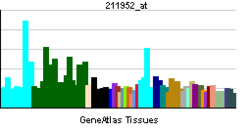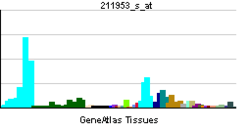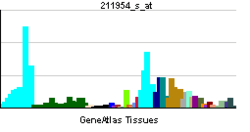IPO5
| View/Edit Human | View/Edit Mouse |
Importin-5 is a protein that in humans is encoded by the IPO5 gene.[3][4][5] The protein encoded by this gene is a member of the importin beta family.
Function
Nuclear transport, a signal- and energy-dependent process, takes place through nuclear pore complexes embedded in the nuclear envelope. The import of proteins containing a nuclear localization signal (NLS) requires the NLS import receptor, a heterodimer of importin alpha and beta subunits also known as karyopherins. Importin alpha binds the NLS-containing cargo in the cytoplasm and importin beta docks the complex at the cytoplasmic side of the nuclear pore complex. In the presence of nucleoside triphosphates and the small GTP binding protein Ran, the complex moves into the nuclear pore complex and the importin subunits dissociate. Importin alpha enters the nucleoplasm with its passenger protein and importin beta remains at the pore. Interactions between importin beta and the FG repeats of nucleoporins are essential in translocation through the pore complex.[6]
IPO5 facilitates cytoplasmic polyadenylation element-binding protein (CPEB)3 translocation by binding to RRM1 motif of CPEB3 in neurons. NMDAR signaling increases RanBP1 expression and reduces the level of cytoplasmic GTP-bound Ran. These changes enhance CPEB3–IPO5 interaction, which consequently accelerates the nuclear import of CPEB3 and promotes its nuclear function.[7]
References
- ↑ "Human PubMed Reference:".
- ↑ "Mouse PubMed Reference:".
- ↑ Yaseen NR, Blobel G (May 1997). "Cloning and characterization of human karyopherin beta3". Proc Natl Acad Sci U S A. 94 (9): 4451–6. doi:10.1073/pnas.94.9.4451. PMC 20743
 . PMID 9114010.
. PMID 9114010. - ↑ Deane R, Schäfer W, Zimmermann HP, Mueller L, Görlich D, Prehn S, Ponstingl H, Bischoff FR (Sep 1997). "Ran-binding protein 5 (RanBP5) is related to the nuclear transport factor importin-beta but interacts differently with RanBP1". Mol Cell Biol. 17 (9): 5087–96. PMC 232359
 . PMID 9271386.
. PMID 9271386. - ↑ Deng T, Engelhardt OG, Thomas B, Akoulitchev AV, Brownlee GG, Fodor E (Nov 2006). "Role of ran binding protein 5 in nuclear import and assembly of the influenza virus RNA polymerase complex". J Virol. 80 (24): 11911–9. doi:10.1128/JVI.01565-06. PMC 1676300
 . PMID 17005651.
. PMID 17005651. - ↑ "Entrez Gene: RANBP5 RAN binding protein 5".
- ↑ Chao HW, Lai YT, Lu YL, Lin CL, Mai W, Huang YS (September 2012). "NMDAR signaling facilitates the IPO5-mediated nuclear import of CPEB3". Nucleic Acids Res. 40 (17): 8484–98. doi:10.1093/nar/gks598. PMC 3458550
 . PMID 22730302.
. PMID 22730302.
Further reading
- Bukrinsky MI, Haffar OK (2004). "HIV-1 nuclear import: in search of a leader.". Front. Biosci. 2: d578–87. doi:10.2741/A213. PMID 9366553.
- Bukrinsky MI, Haffar OK (1998). "HIV-1 nuclear import: matrix protein is back on center stage, this time together with Vpr.". Mol. Med. 4 (3): 138–43. PMC 2230352
 . PMID 9562972.
. PMID 9562972. - Christophe D, Christophe-Hobertus C, Pichon B (2000). "Nuclear targeting of proteins: how many different signals?". Cell. Signal. 12 (5): 337–41. doi:10.1016/S0898-6568(00)00077-2. PMID 10822175.
- Chook YM, Blobel G (2002). "Karyopherins and nuclear import.". Curr. Opin. Struct. Biol. 11 (6): 703–15. doi:10.1016/S0959-440X(01)00264-0. PMID 11751052.
- Bukrinsky MI, Sharova N, Dempsey MP, Stanwick TL, Bukrinskaya AG, Haggerty S, Stevenson M (1992). "Active nuclear import of human immunodeficiency virus type 1 preintegration complexes.". Proc. Natl. Acad. Sci. U.S.A. 89 (14): 6580–4. doi:10.1073/pnas.89.14.6580. PMC 49545
 . PMID 1631159.
. PMID 1631159. - Bukrinsky MI, Haggerty S, Dempsey MP, Sharova N, Adzhubel A, Spitz L, Lewis P, Goldfarb D, Emerman M, Stevenson M (1993). "A nuclear localization signal within HIV-1 matrix protein that governs infection of non-dividing cells.". Nature. 365 (6447): 666–9. doi:10.1038/365666a0. PMID 8105392.
- Maruyama K, Sugano S (1994). "Oligo-capping: a simple method to replace the cap structure of eukaryotic mRNAs with oligoribonucleotides.". Gene. 138 (1-2): 171–4. doi:10.1016/0378-1119(94)90802-8. PMID 8125298.
- Bonaldo MF, Lennon G, Soares MB (1997). "Normalization and subtraction: two approaches to facilitate gene discovery.". Genome Res. 6 (9): 791–806. doi:10.1101/gr.6.9.791. PMID 8889548.
- Gallay P, Hope T, Chin D, Trono D (1997). "HIV-1 infection of nondividing cells through the recognition of integrase by the importin/karyopherin pathway.". Proc. Natl. Acad. Sci. U.S.A. 94 (18): 9825–30. doi:10.1073/pnas.94.18.9825. PMC 23276
 . PMID 9275210.
. PMID 9275210. - Suzuki Y, Yoshitomo-Nakagawa K, Maruyama K, Suyama A, Sugano S (1997). "Construction and characterization of a full length-enriched and a 5'-end-enriched cDNA library.". Gene. 200 (1-2): 149–56. doi:10.1016/S0378-1119(97)00411-3. PMID 9373149.
- Henderson BR, Percipalle P (1998). "Interactions between HIV Rev and nuclear import and export factors: the Rev nuclear localisation signal mediates specific binding to human importin-beta.". J. Mol. Biol. 274 (5): 693–707. doi:10.1006/jmbi.1997.1420. PMID 9405152.
- Efthymiadis A, Briggs LJ, Jans DA (1998). "The HIV-1 Tat nuclear localization sequence confers novel nuclear import properties.". J. Biol. Chem. 273 (3): 1623–8. doi:10.1074/jbc.273.3.1623. PMID 9430704.
- Vodicka MA, Koepp DM, Silver PA, Emerman M (1998). "HIV-1 Vpr interacts with the nuclear transport pathway to promote macrophage infection.". Genes Dev. 12 (2): 175–85. doi:10.1101/gad.12.2.175. PMC 316441
 . PMID 9436978.
. PMID 9436978. - Popov S, Rexach M, Zybarth G, Reiling N, Lee MA, Ratner L, Lane CM, Moore MS, Blobel G, Bukrinsky M (1998). "Viral protein R regulates nuclear import of the HIV-1 pre-integration complex". EMBO J. 17 (4): 909–17. doi:10.1093/emboj/17.4.909. PMC 1170440
 . PMID 9463369.
. PMID 9463369. - Popov S, Rexach M, Ratner L, Blobel G, Bukrinsky M (1998). "Viral protein R regulates docking of the HIV-1 preintegration complex to the nuclear pore complex.". J. Biol. Chem. 273 (21): 13347–52. doi:10.1074/jbc.273.21.13347. PMID 9582382.
- Fouchier RA, Meyer BE, Simon JH, Fischer U, Albright AV, González-Scarano F, Malim MH (1998). "Interaction of the human immunodeficiency virus type 1 Vpr protein with the nuclear pore complex.". J. Virol. 72 (7): 6004–13. PMC 110405
 . PMID 9621063.
. PMID 9621063.


